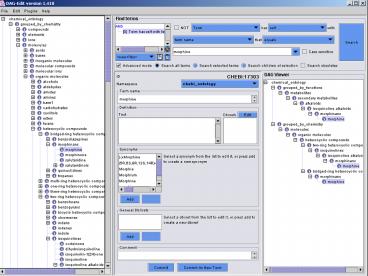A snapshot of Chemical Ontology - PowerPoint PPT Presentation
1 / 15
Title:
A snapshot of Chemical Ontology
Description:
SOFG-2, Philadelphia, October 23-26 2004. A typhoon which wreaked havoc in China in June 2001. The Korean name for a swallow ... FAD. IsPartOf. IsEnantiomerOf ... – PowerPoint PPT presentation
Number of Views:44
Avg rating:3.0/5.0
Title: A snapshot of Chemical Ontology
1
A snapshot of Chemical Ontology
2
Fragment of Chemical Ontology
grouped_by_chemistry
molecules organic molecules heterocyclic
compounds bridged-ring heterocyclic
compounds morphinans
morphine
morphine
IsA
IsA
two-ring heterocyclic compounds
isoquinolines isoquinoline
alkaloids morphinans
morphine
morphinan
3
Relationships in ChEBI ontology
- Current
- IsA inherited from Chemical Ontology - class to
class instance to class
- To be implemented
- IsPartOf - group to molecule group to group
group to class - IsEnantiomerOf - molecule to molecule cycles
allowed - IsTautomerOf - molecule to molecule cycles
allowed - IsConjugateBaseOf/IsConjugateAcidOf - molecule
to molecule (e.g. anion to acid) - IsParentHydrideOf - molecule to molecule
(later?)
4
IsPartOfe.g. Flavin adenine
dinucleotide
adenosyl group
IsPartOf
FAD
5
IsEnantiomerOfEnantiomer One of a pair of
molecular entities which are mirror images of
each other and non-superposable
alpha-D-glucose IsEnantiomerOf
alpha-L-glucose
6
IsTautomerOfTautomerism Isomerism
of the general form GXYZ ? XYZG
where the isomers (tautomers) are readily
interconvertible. Example Uracil (ketoenol
tautomerism)
A IsTautomerOf B IsTautomerOf C
7
IsConjugateBaseOf
- In the cell, most carboxylic acids (RCOOH) will
exist in their anionic forms (RCOO) - Hence, biologists generally refer to anions
(ate rather than ic acid) - COMPOUND uses acid and anionic names
synonymously, but shows diagrams of the free
acids - CO treats anions as children of free acids
- What is best for ChEBI to stick to our
principles or to be practical?
8
Acids versus Anions (2)
prop-2-enoate
IsConjugateBaseOf
prop-2-enoic acid
9
Conjugate bases the phosphate problem (1)
- A chemist differentiates between a true phosphate
- and an acid phosphate
D-glucopyranose 6-(dihydrogen phosphate)
D-glucopyranose 6-phosphate
- In biochemical usage, phosphate indicates the
- phosphate residue regardless of the state of
ionization - or the counter ions present.
10
Conjugate bases the phosphate problem (2)
Phosphate may be used for (dihydrogen
phosphate), (disodium phosphate), etc., (a)
if the nature of the counterions is not known or
is of no importance in the context, or (b) if a
mixture of ionic forms (free acid and/or
monoanion and/or dianion) is in question. Thus
in most biochemical or biological systems, where
the pH is around 7, glucose phosphate may be
used in place of glucose dihydrogen phosphate,
the proper name for the protonated form.
IUPAC-IUB Recommendations, 1976
11
Conjugate bases the phosphate problem (3)
- ChEBI needs to distinguish chemically between
true - and acid phosphates, but needs to employ
- nomenclature that biologists will use.
- Thus to conform with biochemical usage, the
ChEBI - (i.e. recommended) names for both a true
phosphate - and its protonated form need to be
phosphate - incompatible with ontology structure.
D-glucopyranose 6-phosphate
12
IsParentHydrideOf
Parent hydride An unbranched acyclic or cyclic
structure or an acyclic/cyclic structure having
a semisystematic or trivial name to which only
hydrogen atoms are attached.
IUPAC Gold Book
E.g.
benzene IsParentHydrideOf phenol
13
Relationships in ChEBI ontology (2)
Example
(2S)-2-amino-3-oxobutanoic acid
L-2-amino-3-oxobutyric acid
L-2-amino-3-oxobutyrate
14
(No Transcript)
15
Acknowledgements
Kirill Degtyarenko Paula de Matos Michael
Darsow Astrid Fleischmann Henning
Hermjakob Rolf Apweiler Mickael Guedj Martin
Zbinden Financial support though European
Commission Biobabel Grant (no.
QLRT-CT-2001-00981)































